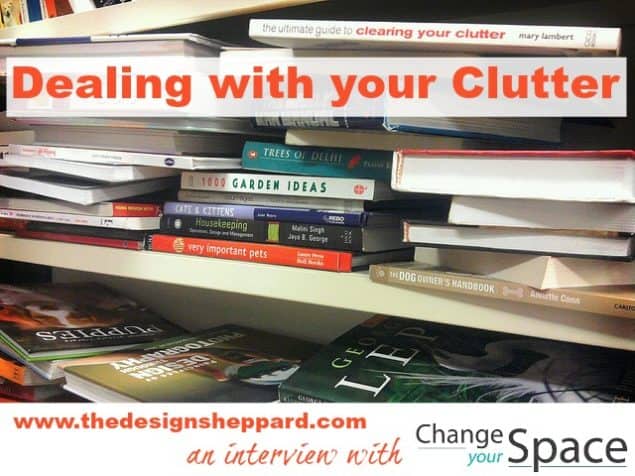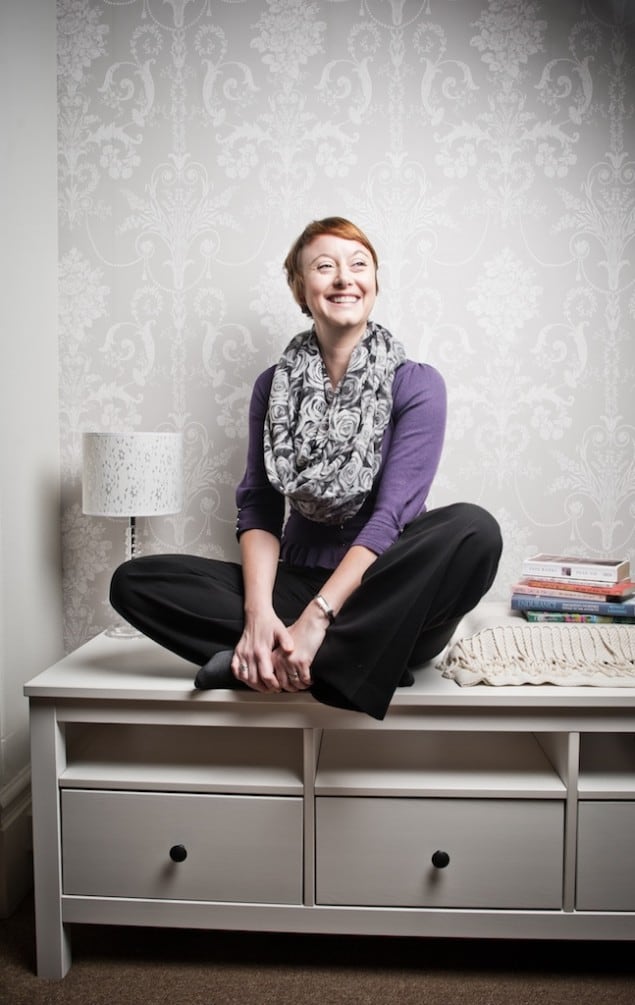
Do you ever get the feeling that you are drowning in a sea of stuff? That your possessions are getting out of control and you just have nowhere left to store anything? Especially after Christmas when you have all those new items that you’ve been given as gifts but that may not actually be needed or wanted. I definitely feel this way at the moment. I consider myself extremely lucky because our flat actually has a rather spacious loft where we can store all our belongings that we don’t want in our living space. However, I’ve recently started to realise that the loft is just a magnet for garbage. We put things up there when really what we should be doing is getting rid of a lot of it. Sometimes though the thought of having a proper clear out is just too daunting. You know it will take ages to sort through everything and then you have to convince yourself to let go of your belongings and that isn’t always easy. Don’t you just wish that there was somebody you could call who could come and help you get organised and throw out all your clutter? Well, I have some fantastic news for you. There is! There are actually people out there working as professional organisers and declutterers whose mission it is to help us live a clutter-free life. I have been lucky enough to interview one of them so we can all find out more about the profession and how it can benefit us.

I first came across Jasmine Sleigh on Twitter when I was writing the news pages for Devon Home magazine not long after it launched. Jasmine is a member of the Association of Professional Declutterers and Organisers UK (APDO-UK) and has been busy sorting out homes and offices for over 12 years. She set up her company, Change your Space, in 2013 and luckily she has agreed to chat with me about her work.
What is your background and how did you become a professional organiser?
I was an information manager for 10 years and in that role had to cut through huge volumes of paperwork to find what we really wanted to know. Did you know that over 80% of what we file we never refer to again? I spent a lot of time reclaiming office space. I was also practicing as a counsellor with a degree in Psychology and Counselling, and could see that change of any sort, including changing ones surroundings, could be part of broader psychological shift for those who felt stuck and unable to move forward. Then my mother reminded me how much I liked moving things around in our home when I was little and we could see this happy marriage of the two areas I enjoyed: organisation and therapeutic change. I applied to APDO-UK and started as a professional organiser in 2013.
Can you explain exactly what a professional organiser does?
A professional organiser is a person-centred and practical enabler which means someone who helps you get the job done but is focused on you as a person and your wants and aspirations. There are about 120 of us across the UK registered with APDO-UK and we are experts in our own specific areas including interior design right up to working with chronic hoarding. I consider myself to have a lot of experience in working sensitively with those who feel overwhelmed and need a step-by-step process to sort their belongings in a kind and efficient way. We are there to honour the character of your home and yourself too. We are not there to create stark minimalism unless that is what you want.
What kind of people contact you for help?
All walks of life. I have conducted a one off sort session for an out building as part of a large scale barn conversion. I have assisted someone to stage their home for sale, pack up for sale then move into their new home effectively. I have arranged delightful playrooms, and I have been the first person in someone’s home for five years where the home is dangerously full. It’s a broad spectrum of requirements. Where there are belongings, there is a fit for a professional organiser.
How useful does your training in counselling come in when you are helping someone to declutter their home?
Having someone in their home and in their cupboards is a significant matter for many. It requires trust, and there is an immediate requirement for empathy and understanding. You can be thrown directly into someones life story, as their belongings reflect who they are. My counselling training has taught me much about active listening, and making appropriate adjustments to give someone the space to thrive. I am trying to complete a very practical task with the client but also leave them feeling very much in control of what is happening.
What are the main reasons that you see for people being reluctant or unable to let go of their surplus possessions?
There is never a tug-of-war over an item. I always tell the tale in my talk “Adventures in Sorting” about a client for whom once we accessed her wardrobe, we discovered a large fur coat in a state of disrepair. She told me it was her mothers, so I was sure she would want to keep it and I was thinking about the best way to store fur well. She then confided in me that she had always hated the coat and so in short it was discarded making room for her own current clothing. I never presume what someone will want to keep or not. I am there for advice and in some cases to give permission for people to make their own minds up about items they have been putting off for a long time. Of course, all of us like to keep things just in case, but we know when have too many spares and it is starting to encroach on our living.
One of the main problems with many modern houses is the distinct lack of storage. What is your advice for keeping a clutter free home with very little storage space?
I usually find that cupboards and existing storage is only half maximised, so even by taking everything out of a cupboard and putting it all back in you will make more room. Plus it is estimated that 30% of the average home is clutter – items we do not now use or have any attachment to. By ridding our homes of clutter we create lots of extra potential. I always look for those “dead” spaces in homes that are not being used for storage, but the biggest opportunities tend to be found by going high or low. Look under the bed or for upper cupboards. Plus there are some amazing small space storage solutions I keep In mind.
As it is the start of the new year many people will be wanting to have a big clear out. Where’s the best place to start?
I usually advise that if you are ready to commit some time then start at the far reaches of your home; the cupboards or spaces that have not been looked in for a while. I have a lot of attic work this time of year! This is where you will find both hidden treasures (belongings you will be thrilled to find again), or clutter (and so free space), or underutilised space (so you can double your capacity by a sort of existing items). This will allow you to open up vastly more space to accommodate items that are taking up your more current areas. Set yourself three hours; one hour to get things out, one hour to “process”, and one hour to put things back where they belong.
Having managed to declutter the home, what should people do to make sure that the clutter stays under control in the future?
Every home requires a reset every now and again, so it should be seen as the sort of task that is a regular part of housekeeping, rather than an onerous task every three years. I sort my son’s toys and clothes thoroughly every 4 months, and my kitchen cupboards twice a year. Reward yourself for recycling and rehoming items you no longer require. The reward should be in seeing more liveable space and not spending the average 15-40 minutes trying to find things each day. But also by having a managed and careful sort it will hopefully be more fun than you thought and you will therefore be inspired to give it a go again. Review as part of your life!
Like many people, I tend to keep a lot of my belongings as I don’t like the idea of perfectly good things ending up in landfill and I also fear I’ll throw something out that I will end up needing at a later date. How can we get over this?
There are so many ways to recycle and rehome now that very little goes to landfill. The recycling industry is one of the parts of the economy that is booming, and it is estimated that about £32.7 billion is available in all the clutter in our homes if it was rehomed and recycled tomorrow. I have a whole database of contacts for rehoming all sorts of items. Recently I assisted someone sort a garage prior to selling the house and we arranged a collection of hand tools by a local community group who conducted path clearance and trained unemployed young men in horticultural skills. It was thrilling for the gentleman to see his legacy of rehoming all these items he would not use again.
In short, be generous and free, let items go out there in the world and be useful and appreciated, or at the very least made into something else. If you need that item in five years’ time, forgive yourself as its only stuff and can be replaced. As long as you have a place for your vital keepsakes, and your essentials, you can be reassured that at least giving things away you are able to enjoy your living space more comfortably.
Lastly what are your top tips for living clutter free?
1. Block the time to do it, it’s a key task, schedule it. Set a timer – minimum 20 minutes, maximum 4 hours. Cancel all distractions.
2. If you have not reviewed for a while then conduct a ‘first sift’ and don’t get into difficult areas or decisions. Just find what is clearly no longer needed and find its route out of the home. Second sift is a more detailed review and can come another day when you feel buoyed up on the space you have already created.
3. If you are daunted, invite a professional organiser round to do a consultation. I conduct an hour Space Review and it is your bespoke guide to maximising your efforts. Rather than spending lots of your personal time without real results, this will give you a focus to get the best from your sort time! If you are still unsure, you can invite me back to work with you as an extra pair of hands and a smiley presence to expertly guide you through a significant project.
You can email Jasmine for a free Getting Organised resource with more tips. Her email address is : jasmine@changeyourspace.co.uk
The image featured at the start of this post was taken by Spykster and is licenced under Creative Commons. The text was added by me.
